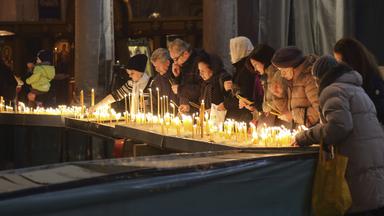“When religion strengthens values, builds communities, creates educational networks, motivates people to social action and to philanthropic work, it is speaking to the better angels of our nature.” — Rabbi Jonathan Sacks[1]
Where does religion happen? In church, some might say, or a synagogue, mosque or monastery. Others will say it happens at home or even in the solitude of one’s heart. People of faith pray, listen to sermons, study scripture and perform rituals in their own houses of worship. But religion does not end there. The religious life carries over into the bustle and noise of society. Religion, therefore, happens wherever people are.

Far beyond the walls of the church, religious individuals and organizations build hospitals and schools, operate charities and shelters, run businesses and think tanks, teach youth groups and literacy programs, distribute humanitarian aid across the globe and find work for the unemployed.
Such efforts have long been fixtures of our public square. Professor Paul Rowe wrote, “Religious contributions to civil society are indispensable to upholding both the dignity of respect for religious traditions and a normative commitment to social progress in human society.”[2]
Yet the influence of the religious voice should not be taken for granted. It still has to prove itself in the marketplace of ideas.
When people leave their homes every day and enter society, they bring with them a host of beliefs, motivations, intuitions and moral convictions. The things we believe and the opinions we hold shape the discourse of our communities. Fellow students might argue about the separation of church and state. Neighbors might debate the purpose of marriage. School board members weigh what kinds of values should be taught in the curriculum. But the test of a civil society is to let every lawful voice have its say.
The religious experience of a person varies according to time, place and culture. And since everyone has beliefs about the ultimate questions of life, we should allow everyone the space to express them. Freedoms work together in the public square. The free exercise of religion has more meaning when people are allowed to freely associate with whom they please. And freedom of speech only makes sense when the beliefs behind that speech are also protected. We fail when people dare not speak their minds or practice their faith because of intolerance or intimidation.
Honoring religious expression is important because religion itself is important. Much of what is good in society grows from the soil of faith. Prayers and meditations dignify our most solemn public ceremonies. Political leaders invoke God’s blessing in times of crisis. Religious rituals mark life’s pivotal moments of birth, marriage and death. Our understanding of human rights stems from religious ideals.
Recognizing the civic good of our religious heritage, author Stephen Carter explains, “Only religion possesses the majesty, the power, and the sacred language to teach all of us, the religious and the secular, the genuine appreciation for each other on which a successful civility must rest.”[3]
Though many think of religion as something that happens only within a church, the actual practice of religion goes far beyond. In a pluralistic society we can’t live together with our deepest differences unless we are able to share with each other our highest aspirations.
[1] In Jack West, “Confronting Religious Violence: An Interview with Rabbi Lord Jonathan Sacks,” Religion & Politics, Jan. 5, 2016.
[2] Paul S. Rowe, “Can We Co-exist? Religion, Civil Society, and Global Order,” chapter in Towards the ‘Dignity of Difference’? Neither ‘End of History’ nor ‘Clash of Civilizations,’ Mojtaba Mahdavi and W. Andy Knight, eds. (2012), 309-31.
[3] Stephen L. Carter, Civility: Manners, Morals, and the Etiquette of Democracy (1998).